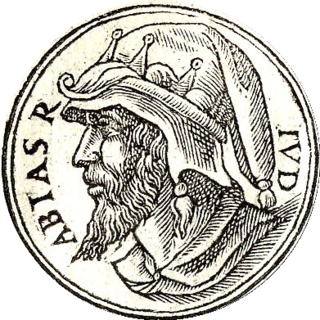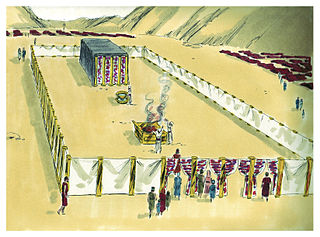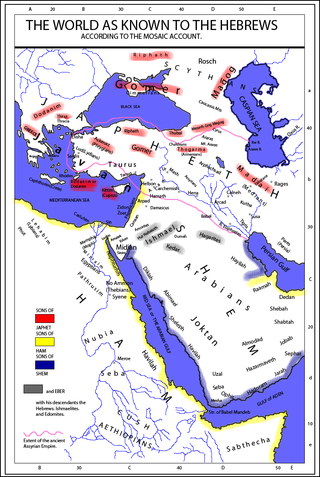Related Research Articles

Abijam was, according to the Hebrew Bible, the fourth king of the House of David and the second of the Kingdom of Judah. He was the son of Rehoboam and the grandson of Solomon. The Books of Chronicles refer to him as Abijah.

Moriah is the name given to a mountainous region in the Book of Genesis, where the binding of Isaac by Abraham is said to have taken place. Jews identify the region mentioned in Genesis and the specific mountain in which the near-sacrifice is said to have occurred with "Mount Moriah", mentioned in the Book of Chronicles as the place where Solomon's Temple is said to have been built, and both these locations are also identified with the current Temple Mount in Jerusalem. The Samaritan Torah, on the other hand, transliterates the place mentioned for the binding of Isaac as Moreh, a name for the region near modern-day Nablus. It is believed by the Samaritans that the near-sacrifice actually took place on Mount Gerizim, near Nablus in the West Bank.

The Generations of Noah, also called the Table of Nations or Origines Gentium, is a genealogy of the sons of Noah, according to the Hebrew Bible, and their dispersion into many lands after the Flood, focusing on the major known societies. The term nations to describe the descendants is a standard English translation of the Hebrew word "goyim", following the c. 400 CE Latin Vulgate's "nationes", and does not have the same political connotations that the word entails today.
In the biblical Book of Genesis, Er was the eldest son of Judah and his Canaanite wife, the daughter of Shuah. He is described as marrying Tamar. According to the text, "the LORD slew" Er because he was wicked, although it does not give any further details. This Er had two brothers, Onan and Shelah.

Keturah was a wife and a concubine of the Biblical patriarch Abraham. According to the Book of Genesis, Abraham married Keturah after the death of his first wife, Sarah. Abraham and Keturah had six sons.

Leviticus 18 deals with a number of sexual activities considered abominable, including incest, bestiality, and sodomy. The chapter also condemns Moloch worship. It is part of the Holiness Code, and its sexual prohibitions are largely paralleled by Leviticus 20, except that chapter 20 has more emphasis on punishment.

Kittim was a settlement in present-day Larnaca on the east coast of Cyprus, known in ancient times as Kition, or Citium. On this basis, the whole island became known as "Kittim" in Hebrew, including the Hebrew Bible. However the name seems to have been employed with some flexibility in Hebrew literature. It was often applied to all the Aegean islands and even to "the W[est] in general, but esp[ecially] the seafaring W[est]". Flavius Josephus records in his Antiquities of the Jews that
Dedan has several different meanings in the Hebrew Bible. Dedan was an oasis and city-state of north-western Arabia. The people of Dedan are called Dedanim or Dedanites. Dedan is also the name of the son of Raamah and the son of Jokshan.
Zimran, also known as Zambran, was, according to the Hebrew Bible, the first son of the marriage of Abraham, the patriarch of the Israelites, and Keturah, whom he wed after the death of Sarah. Zimran had five other brothers, Jokshan, Medan, Midian, Ishbak, and Shuah.
Jokshan. According to the Bible he was a son of Abraham (Avraham) and his wife or concubine Keturah, whom he wed after the death of Sarah. Jokshan had five brothers: Zimran, Medan, Midian, Ishbak and Shuah; as well as two half brothers: Ishmael (Ismail) and Isaac (Ishaq). He was Keturah's second son and Abraham's fourth.
According to the Bible, Medan ; also spelt Madan was the third son of Abraham, the patriarch of the Israelites, and Keturah whom he wed after the death of Sarah. Medan had five brothers, Zimran, Jokshan, Midian, Ishbak, and Shuah.
Ishbak, also spelled Jisbak and Josabak, was, according to the Bible, the fifth son of Abraham and Keturah. Ishbak had five brothers, Zimran, Jokshan, Medan, Midian and Shuah.
According to the Hebrew Bible, Midian is the fourth son of Abraham and Keturah, the woman Abraham married after Sarah's death. His brothers are Zimran, Jokshan, Midian, Ishbak and Shuah. His sons are Ephah, Epher, Enoch, Abida, and Eldaah.
Ephah was one of Midian's five sons as listed in the Hebrew Bible. Midian, a son of Abraham, was the father of Ephah, Epher, Enoch, Abida, and Eldaah by his wife Keturah. These five were the progenitors of the Midianites.

Selah, Salah or Sala or Shelah is an ancestor of the Israelites and Ishmaelites according to the Table of Nations in Genesis 10. He is thus one of the table's "seventy names". He is also mentioned in Genesis 11:12–15, 1 Chronicles 1:18–24, and Luke 3:35–36.
The Literal English Version of Scripture (LEV) is a translation of the Bible based on the World English Bible. Formerly known as the "Shem Qadosh Version", the title was officially changed in November 2016. It is considered a Sacred Name Bible rendering the name of God using the Hebrew characters יהוה, and that of Jesus in Hebrew as ישוע. It was created by a team of volunteers across the United States with additional proofing and editing assistance by individuals in Poland and Taiwan. Footnotes and appendices were written by the General Editor, J. A. Brown.
Isaiah 29 is the twenty-ninth chapter of the Book of Isaiah in the Hebrew Bible or the Old Testament of the Christian Bible. This book contains the prophecies attributed to the prophet Isaiah, and is one of the Book of the Prophets. The Jerusalem Bible groups chapters 28-35 together as a collection of "poems on Israel and Judah".

1 Chronicles 1 is the first chapter of the Books of Chronicles in the Hebrew Bible or the First Book of Chronicles in the Old Testament of the Christian Bible. The book is compiled from older sources by an unknown person or group, designated by modern scholars as "the Chronicler", and had the final shape established in late fifth or fourth century BCE. The content of this chapter is the genealogy list from Adam to Israel (=Jacob) in the following structure: Adam to Noah ; Noah's descendants from his three sons Shem, Ham, and Japheth: the Japhethites, Hamites, Semites ; the sons of Abraham ; the sons of Isaac. This chapter belongs to the section focusing on the list of genealogies from Adam to the lists of the people returning from exile in Babylon.
References
- ↑ Hitchcock's Bible Dictionary: Shuah
- ↑ Brown-Driver-Briggs
- 1 2 Genesis 25:1–6
- ↑ 1 Chronicles 1:32
- ↑ From the Septuagint and Brenton
- 1 2 Josephus, Flavius, Antiquities, 1.15.1 Greek Whiston
- ↑ In this case the word is applied to the cave dwelling peoples of the Rift Valley
- ↑ Seventh-day Adventist Bible Commentary, Review and Herald Publishing Association (Washington, D.C., USA), 1953, p.367
- ↑ Job 2:11; 8:1
- ↑ Brown-Driver-Briggs
- ↑ Strong's Concordance
- ↑ Genesis 38:2,12
- ↑ The Hebrew says "his name", and Genesis 38:12 refers to the death of Shuah's daughter.
- ↑ John Parker Lawson (1850). The Bible Cyclopedia. Vol. 3. p. 791.
- ↑ John Kitto (1869). An Illustrated History of the Holy Bible. p. 139.
- ↑ From the Septuagint and Brenton .
- ↑ Richard S. Chapin (1999). The Biblical Personality. Jason Aronson. p. 48. ISBN 9780765760333.
- ↑ Sefer haYashar . Chapter 45:4,29
- ↑ 1 Chronicles 3:5
- ↑ 1 Chronicles 4:11
- ↑ מקראות גדולות דברי הימים א
- ↑ Nave's Topical Index
- ↑ From the Septuagint and Brenton .
- ↑ Strong's Concordance
- ↑ 1 Chronicles 7:32
- ↑ From the Septuagint and Brenton .